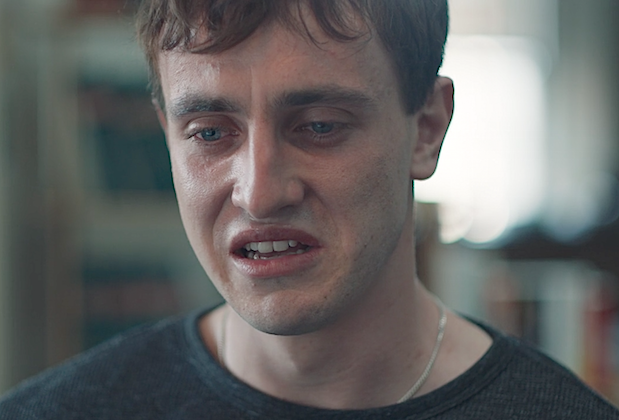
At the beginning of episode nine of Normal People, Lukas asks Marianne: “Why are you on your own?”
The show seems to ask this of its protagonists – or rather, “why do you feel that you are on your own?”. Episode nine explores Marianne’s low self-esteem, while episode 10 examines Con’s own mental health issues.
Episode eight was set against the beautiful backdrop of the Italian countryside. Episode nine appropriately replaces this with the cold austerity of wintertime Sweden. Marianne is studying there on Erasmus. She doesn’t appear to have many friends – she doesn’t seem to want any. Over breakfast, she attempts to end whatever relationship she has with Lukas. “What do you want?”, he asks before adding: “I really like you.”
“That. I don’t want that”, she tells him. “I want, if anything, the opposite.”
Marianne’s feelings of worthlessness are latent throughout the show. They came to the surface in episode eight when she confided in Con that her brother, in front of her mother, told her that no one would care if she died. Her relationship to Lukas becomes an unhealthy extension of such thoughts.
Sex as a storytelling device has been one of the most impressive things about Normal People
Sex as a storytelling device has been one of the most impressive things about Normal People. Episode nine is no different. We see Con having sex with his current girlfriend Helen. The show makes a point of having her on top of him throughout the scene: sexual power and pleasure are divided equally in their relationship.
This scene contrasts with the following one. Marianne is lying down, unmoving, her hands tied behind her head, seemingly indifferent. When she looks away, Lukas slows down until she returns his gaze. Afterwards, Marianne says: “I want to have a shower.” “We’re not done here”, Lukas tells her – “I’ll tell you when it’s over and you can have a shower”. His words – “you’re worthless. You’re nothing” – echo her brother’s, and re-enforce the emotions that Marianne has already internalised.
Over text, she confesses to Con that she has not been feeling herself lately. She clarifies: “Not in a bad way.” She tells him that she avoids making eye contact with people. She adds, most pertinently, that there’s “something good about feeling sort of numb”. This sentence explains Marianne’s mental state: self-hatred makes the hatred of others’ easier to bear. Her self-loathing is a defence mechanism.
Marianne’s messages worry Con. So do the rumours of her sadomasochistic experiences in Sweden. Marianne’s old friend Peggy tells Con of these. He subsequently reaches out to Marianne. His email overlays the episode’s final minutes. The concluding scene is of Lukas doing a photoshoot of an increasingly naked Marianne. Con’s email ends with the lines: “Just because people treat you badly at times, and I include myself in that by the way, it doesn’t mean you deserve to be treated badly. A lot of people love you and care about you. I hope you know that.”
His words linger in Marianne’s mind: they help to give her the encouragement and confidence that she needs in order to leave Lukas.

Episode 10 turns its attention to Con. Outside a psychiatrist’s office, on a self-assessment sheet, he circles the most critical of four possibilities – “I dislike myself”. Con’s feelings of alienation have been apparent since he first started life in Trinity. While Marianne excelled socially, he struggled to make friends. His own issues come to a crisis when he learns of his friend Rob’s suicide back in his hometown of Carricklea.
This episode is almost entirely set in the psychiatrist’s office. The episode is essentially a soliloquy of sorts by Con, which features interjections by the psychiatrist and flashbacks that illuminate the recent past. Con is more vulnerable than we’ve previously seen him: “I left Carricklea thinking I could have a different life. But I hate it here. And I can never go back because those friendships are gone.”
Despite his honesty in the psychiatrist’s office, the episode’s flashbacks remind us of Con’s previous inability to voice his emotions. At the news of Rob’s death, he cries silently to his mother Lorraine. At the funeral the next day, the only moment of catharsis he seems to get is from seeing Marianne for the first time in months.
Around this time his relationship to Helen begins to deteriorate. She asks him why he didn’t introduce her to any of his friends after the funeral. She correctly perceives that he is turning away from her. Con cannot explain nor express how he feels and so he unfairly turns Helen’s words against her: “Look I’m sorry you didn’t have a good time. But like, it was a funeral. Don’t really know what you expected.”
His words – “you’re worthless. You’re nothing” – echo her brother’s, and re-enforce the emotions that Marianne has already internalised
This episode, like the previous one, is unafraid to go to dark places. Mercifully, it ends somewhere brighter. It concludes with a Skype call between Marianne and Con. She asks him how he feels after his psychiatric session. He is typically reserved. “Okay. Just flat, I guess.” As the conversation proceeds, however, it is clear that he is more open. When they discuss Rob, he says “he was insecure. Obsessed with being liked. I mean, I know I can talk”.
It’s hard to imagine Con admitting this before the psychiatrist session. Until then, his moments of self-reproach and self-evaluation tended to arise from a sense of guilt, usually as a result of his behaviour toward Marianne. But repentance doesn’t spurn this admittance nor its follow up, the simple “I miss you”, which he says to Marianne.
His words remain characteristically short, but their honesty suggests that the psychiatry session has benefitted Con.
In the episode’s final shot, Con awakes in bed. “Everything I Am Is Yours” by Villagers begins to play. Before the screen cuts to black, we hear the opening lyric: “I am just a man.” It’s a poignant line that seems to encapsulate everything which this episode is trying to say – that it is OK to feel these things, because we’re all just human at the end of the day.
The show’s depiction of mental health is as graceful and as raw as one could hope. It seems to simply conclude that it helps to admit how you feel and to talk to those who you are close to. Having started to come to terms with themselves, perhaps Con and Marianne can now begin to come to terms with what they mean to one another. These two spectacular episodes of television perfectly set up next week’s final two.






